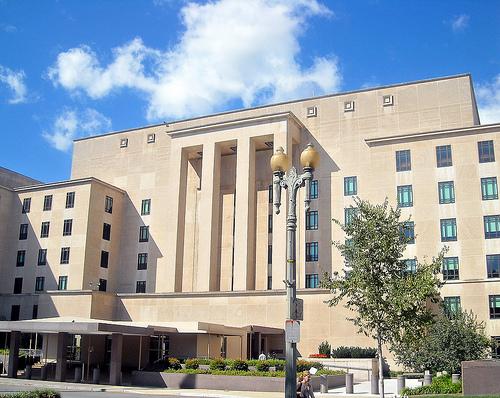Late in June, the U.S. State Department released this year’s Trafficking in Persons Report (TIP), an annual report that informs the public on U.S. efforts to fight human trafficking. As usual, the 60-page report ranks countries by tiers based on how well they fight trafficking within their borders. Of the roughly 200 evaluated countries, 22 are in tier 3 (bottommost tier), most from the Middle East and Africa. However, the report includes a much richer database of information than solely rankings. Some of its contents are commendable: a focus on victim services, investigative bodies, and the private sector. Other areas of the report show weakness: no mention of diplomatic immunity, the presidential waiver for strategic countries, and comprehensive law for licensing labor brokers.

The State Department’s latest trafficking report acknowledges victims need intensive support, but does not stand up to undo diplomatic immunity. Creative Commons photo by NCinDC.
The TIP report acknowledges that due to the trauma that they have experienced and common language barriers, victims of human trafficking need intensive services. A growing number of victims are domestic workers who may have spent the entirety of their lives in America confined to their employer’s home. The report highlights that victims especially need more legal services. From 2005-2010, 19 million more people crossed borders as migrants and as abuse increases, so must punitive efforts. Second, the TIP report states that victims need more investigative efforts. The U.S. Department of Labor, which conducts investigations for labor abuses, has “not yet been funded, trained or given the mandate to focus on human trafficking cases.”
Out of the available 5,000 visas available to victims, only 447 are claimed, not because of an absence in trafficking but because law officials are under-equipped to find victims. Lastly, the report deserves a thumbs-up for recognizing the important role the private sector can play in this fight. It acknowledges that NGO’s work on the ground with victims and need more government funding and that businesses need to increase monitoring over their supply chains. The report suggests some effective ideas such as that the government can provide more funding to NGO’s and create laws to increase business transparency.
The report, however, avoids standing firm on several issues. There is no mention of diplomatic immunity. After attempted rape charges by a domestic worker at his hotel, former IMF president Dominique Strauss-Kahn was just released from house arrest. Strauss-Kahn and other diplomats like Alan Mzengi, a Tanzanian diplomat who enslaved a teenage girl for 4 years in his home in Maryland, have immunity under the 1961 Vienna Convention. When 3,500 domestic workers annually come to the U.S. to work for diplomats, the TIP report should have at least mentioned that trafficking by diplomats is unacceptable. In addition, there is no mention of the presidential waiver. The TIP report states that the U.S. will sanction tier 3 countries but usually the president waives most of these countries because they are in our national interest; in 2009, only 2 out of 17 tier 3 countries were fully sanctioned. Of course, these 2 countries were Cuba and North Korea.
Most importantly, the report falls short on mandatory licenses for labor brokers. The report continually gives examples of the power that labor brokers have over victims’ lives, like Maira, a Honduran girl whose labor brokers tricked her and sold her to a brothel instead of the promised textile factory. She was only 15 years old. The TIP report suggests countries mandate recruiting fee caps, punish abusive recruiters more harshly, establish complaint procedures, and ensure competition among recruiters. However, the most effective way to keep labor recruiters accountable would be to mandate licenses. The report praises the Philippine Overseas Employment Administration (POEA), which authorizes all recruitment agencies in the Philippines, as highly successful. The report must push to extend such a model internationally and keep labor recruiters more accountable.
The TIP report clearly has some ground to cover. Even though it shows the dire need for more victim services, investigations, and highlights the role of private actors, it has shied away from controversial subjects. The Strauss-Kahn case overwhelmingly shows how diplomatic abuse is hidden from the public eye and the need to protect workers from diplomats is a basic right. In addition, the report has not addressed presidential waivers for tier 3 countries, for to do so would involve limiting the power of the executive branch. The report must also keep labor recruiters in check and step into how businesses recruit their workers. In order to stop trafficking, the State Department must face the facts and push some buttons.
